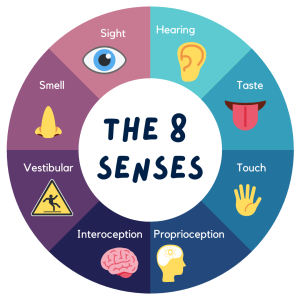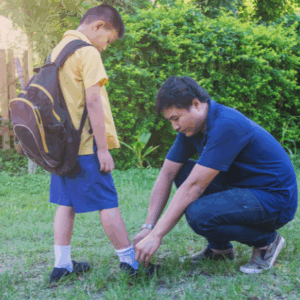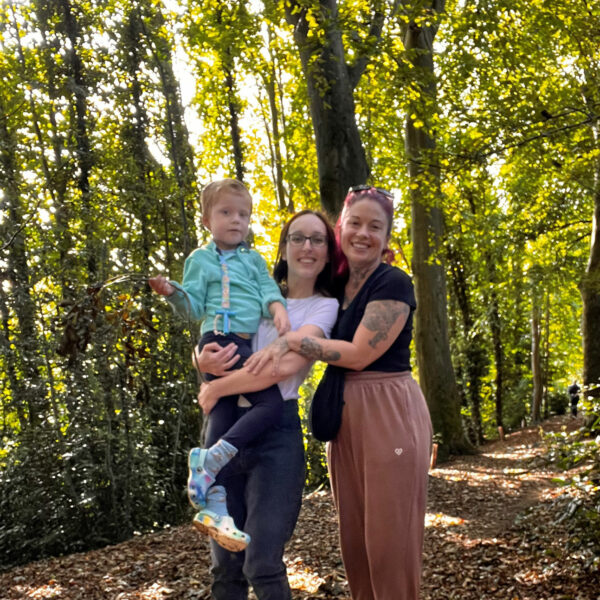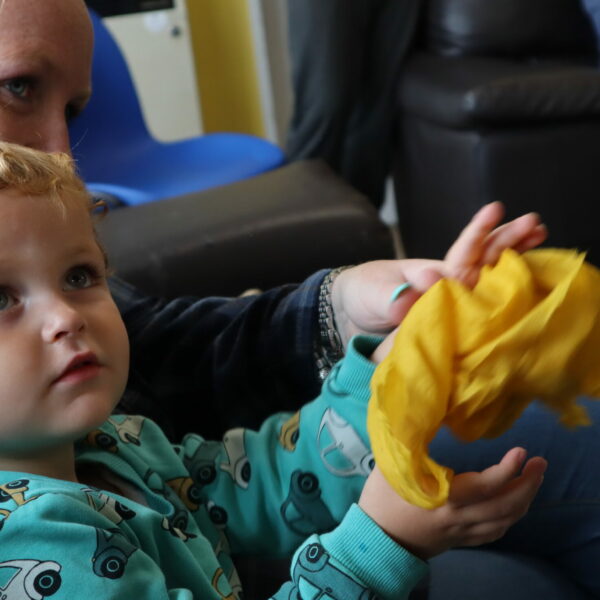Sensory processing
Information and signposting for parent carers of a child or young person experiencing sensory processing differences.
What are sensory processing differences?
Our senses give us important information about ourselves and the world around us. Most people know about five of our senses – sight, hearing, touch, taste and smell. We also have other senses that are less known called proprioception (pro-pree-oh-sep-shun), which tells us where our bodies are and how to move our limbs and how much strength our muscles should use; interoception (in-ter-oh-sep-shun), which tells us what is going on in our such as feeling hungry, so we know we must eat, or having a full bladder which means we must go to the toilet ; and our vestibular (ves-tib-yoo-lah) system, which tells us how we are moving and controls our sense of balance and speed of movement.
Everyone processes information from their senses differently and it’s perfectly natural that some of us are more sensitive than others, for example some people may find certain smells overpowering when other people are not really aware of them, or hate going to places that are crowded, with loud music while other people absolutely love going to gigs and concerts. Sensory processing differences are only an issue if they impact a person’s ability to do the things they want or need to do as part of everyday life.
When the way in which a person processes sensory information affects daily living, social skills, school, work or behaviour this may lead to an occupational therapist identifying that a person has sensory processing difficulties.
People with sensory processing difficulties usually have other neurodifferences such as autism, ADHD, dyspraxia, dyslexia, Tourette syndrome or other learning disabilities.

A word about language
We talk about sensory processing differences in line with our neuro-affirmative approach but also make reference to ‘sensory processing difficulties’ as this reflects the language you are likely to hear when you talk to services, particularly during assessments by health practitioners. See our page on Amaze’s use of language for more information on this.
Characteristics of sensory processing differences
In people with sensory processing difficulties, the brain may struggle to process information from the senses, which affects the way people react to stimuli. You may hear professionals talk about people as being ‘dysregulated’ when they are struggling with sensory difficulties.
People who are over-reactive will tend to become quickly overwhelmed by sensory information. For example, they may find loud noises or busy, crowded places very tricky and quickly become stressed and upset. This can be particularly hard for children and young people as they try to navigate busy classrooms and noisy playgrounds and, in some cases, it can eventually lead to them trying to avoid school as they feel so overwhelmed.
On the other hand, people who are under-reactive may need extra stimulation to help them feel regulated, so they may seek out sound by making noises themselves or playing loud music, for example.
It is important to recognise that many people with sensory processing difficulties will be a mix of under- and over-reactive to different things and at different times. So, for example, someone may be extremely sensitive to smells that most people don’t notice, but under-sensitive to movement, which means they are always ‘on the go’ – jumping, spinning or bouncing as they try to give their body the extra feedback it needs. Again, for some children and young people this can be tricky at school, as a child may be seen as ‘fidgety’ or ‘disruptive’ because they find it harder to sit still in the classroom.
Co-occuring conditions
People with sensory processing differences may have other co-occurring conditions such as autism and/or ADHD. Some people may also have difficulties recognising and regulating their emotions, which can affect their mental health.
On a day-to-day basis sensory processing differences can also be influenced by other factors such as sleep, stress levels and physical and mental health, as at times when someone is not feeling their best it can be harder to self-regulate.
Identifying sensory processing difficulties
Currently, sensory processing difficulties are not recognised as a stand-alone diagnosis within the NHS, but sensory processing difficulties can be assessed for and identified by an occupational therapist (OT).
Support for sensory processing difficulties
Brighton and Hove and East Sussex occupational therapy services have universal resources available online to support families initially, including videos and strategies that can be used to help children and young people at home. They also have resources such as sensory circuits for schools to build into the school day to support children with their sensory regulation.
Sensory processing difficulties can also be supported with sensory integration therapy. This is usually offered privately by occupational therapists, speech and language therapists and physiotherapists who hold post-graduate qualifications in sensory integration, so it can be expensive.
If further support is required after trying the resources above and a referral to the occupational therapy service is needed, in Brighton & Hove this can be made by a professional working with the child or young person.
In East Sussex families can contact Therapy One Point on 0300 123 2650 to discuss their concerns.
Local services that can help
Amaze ND Family Support is for parent carers with a child or young person who is at any point along the assessment pathway for a neurodevelopmental difference such as autism and ADHD. You can get advice and guidance right from when a problem is first flagged, through assessment, diagnosis (or otherwise) and beyond. We also run parent support groups across Brighton & Hove and East Sussex, some with a neurodevelopmental focus (see below).
For impartial information, advice and support on education, health, social care and disability related benefits, contact our SENDIASS advice line.
If your child or young person’s needs mean that they need much more care than other people of the same age, you might wish to consider applying for Disability Living Allowance for under 16s, or Personal Independence Payment for over 16s. You can apply, even if your child or young person does not have a diagnosis.
BHISS (Brighton & Hove Inclusion Support Service) works with nurseries, playgroups and childminders registered with Ofsted, as well as schools and colleges to support children and young people with special educational needs and disabilities (SEND), and their families.
Education East Sussex’s Inclusion Team which is part of the Team Around the School and Setting (TASS) who support schools with improving inclusion, outcomes and attendance. Schools must make the referral. [replaces ESBAS]
You can find other services on your Local Offer – the local authority’s online listing of all the services and support for families with children with SEND in the area:
Support groups
Amaze runs parent support groups across Brighton & Hove and East Sussex, which you may find helpful to come along to. Some of these groups have a neurodevelopmental focus. If it is tricky to attend groups in person, we also have online groups that parents can join. Visit our parent groups and befriending page or see our calendar of events.
You can find a number of online parent support groups for families of children with sensory processing differences. Go to Facebook and search for ‘sensory processing UK.’
Further information
Videos
- Sensory processing bitesize videos by Sussex Community Foundation Trust occupational therapists
- Videos on sensory processing by East Sussex children’s occupational therapists
Online and printed resources
- Cerebra – resources on sensory processing. It also has a free sensory toy library, where parents can try sensory toys before they buy them see
- The National Autistic Society – sensory processing differences resources for all audiences
- The Out of Sync Child US website with information, books and other resources
- The Sensory Integration Network website with resources, also offers training for parents and professionals
Sensory toy and equipment stockists
Books
- The Out of Sync Child by Carol Stock Kranowitz (Tarcher Perigee Books ISBN: 978-0593419410) (NB new edition)
- Building Bridges through Sensory Integration by Paula Aquilla, Shirley Sutton & Ellen Yack (Future Horizons, ISBN: 978-1935567455).
- Sensational Kids; Hope and help for children with sensory processing disorder (SPD) by Lucy Jane Miller (Penguin Random House USA ISBN: 978-0399167829).
- Too Loud, Too Bright, Too Fast, Too Tight: What to do if you are sensory defensive in an overstimulating world by Sharon Heller (Harper Perennial ISBN: 978-0060932923)
Get ND Family Support
Parent carers in Brighton & Hove or East Sussex with a child (under 25) at any stage on the neurodevelopmental pathway can get support from Amaze ND Family Support Service.








